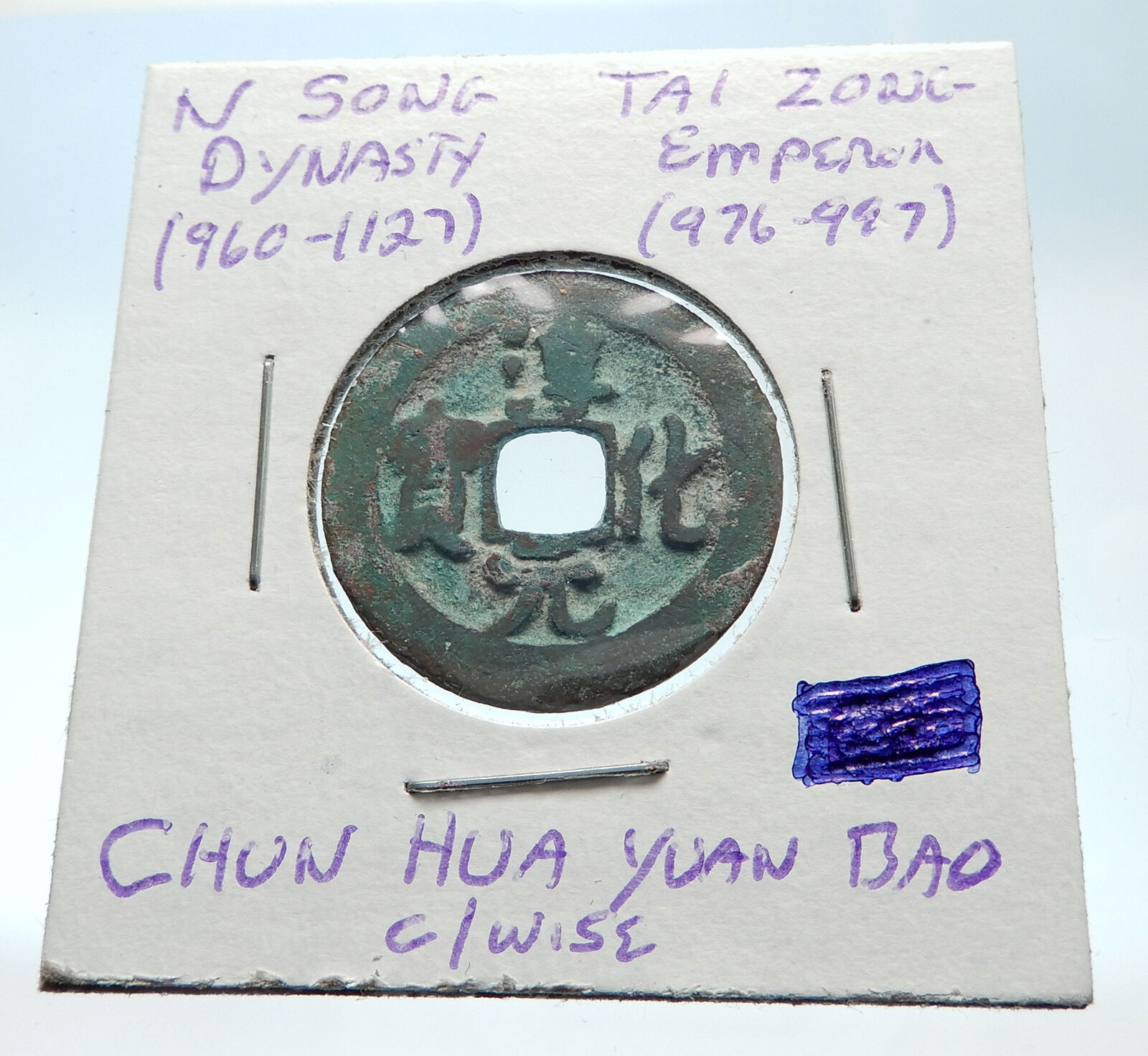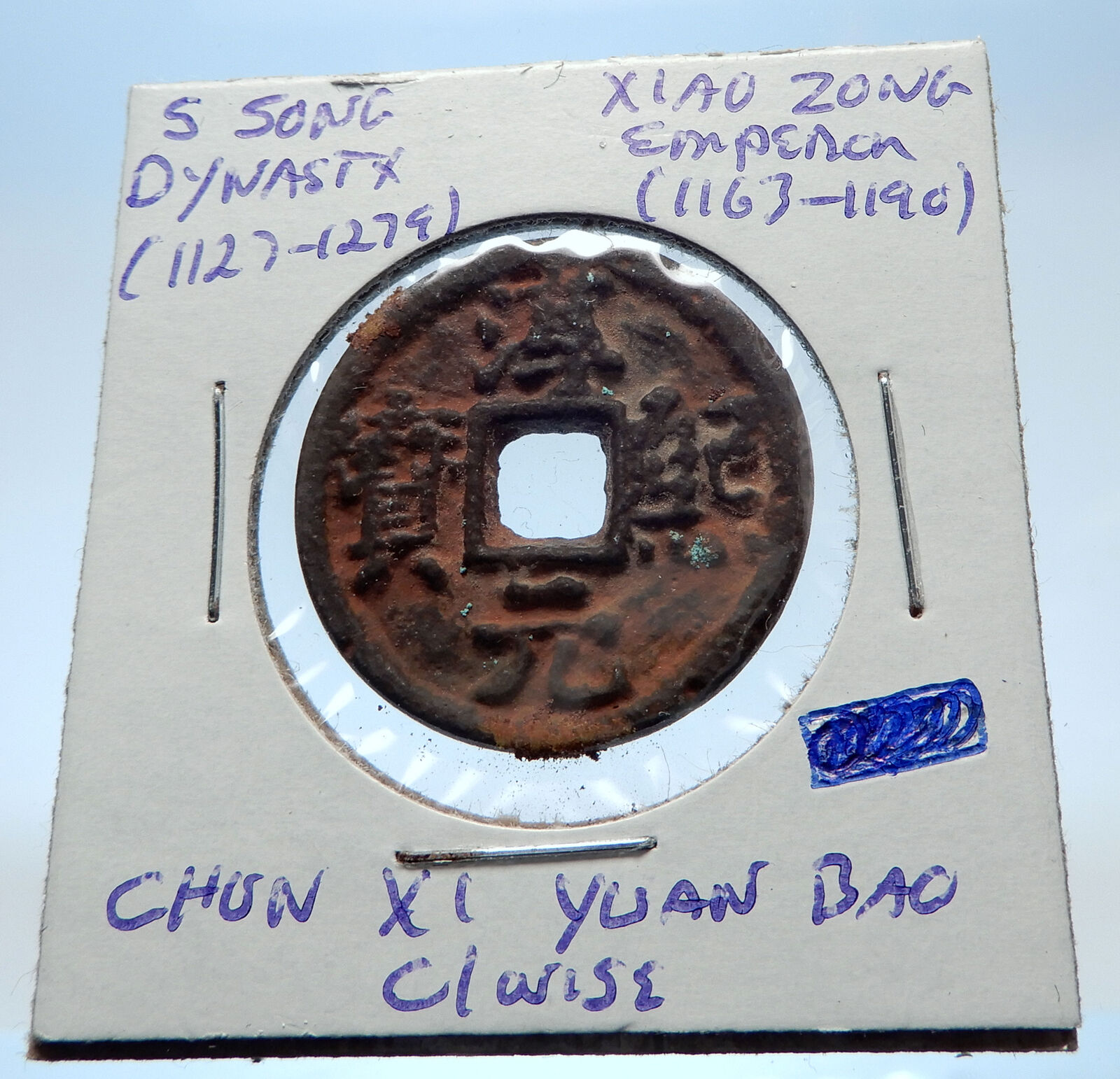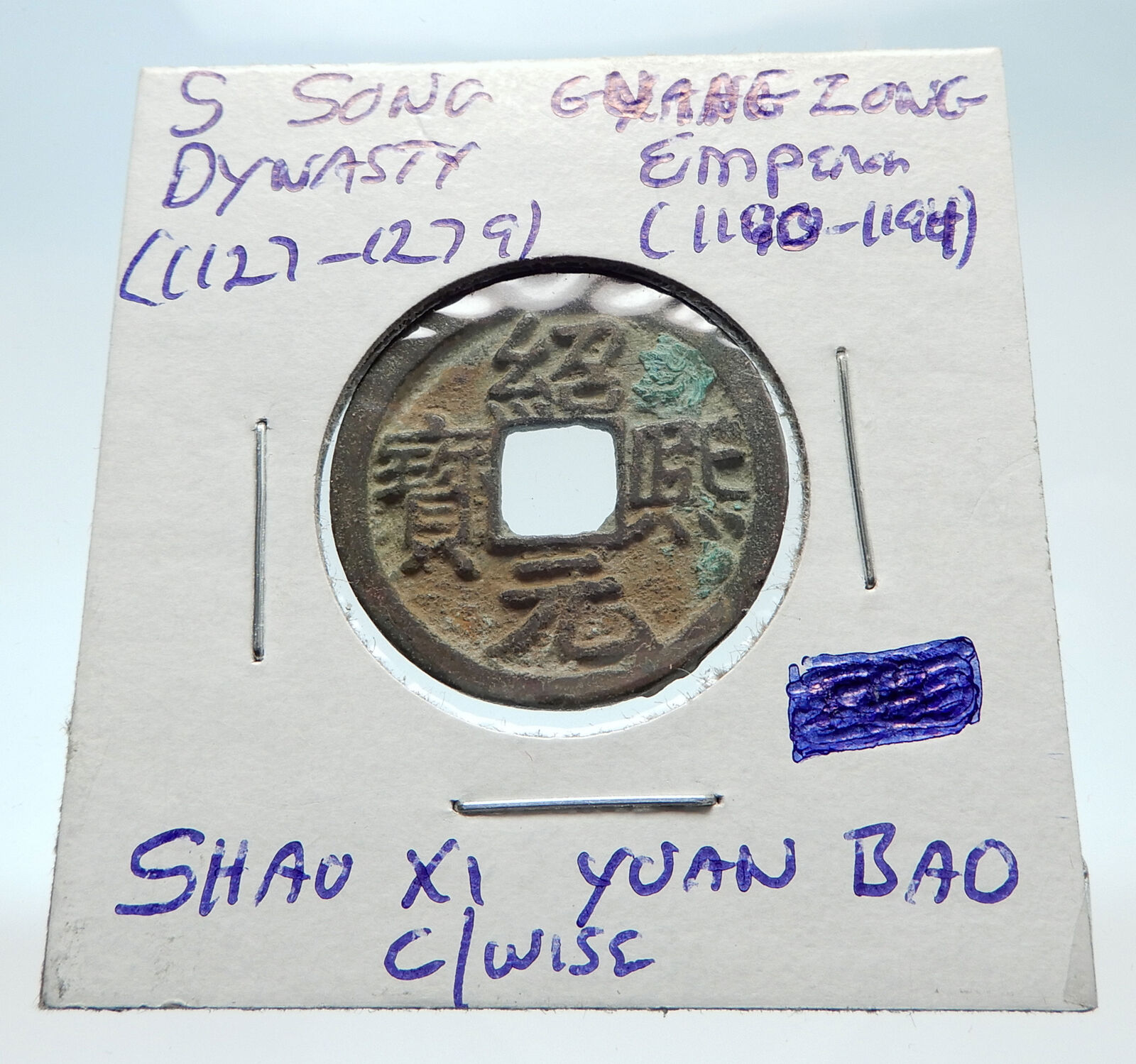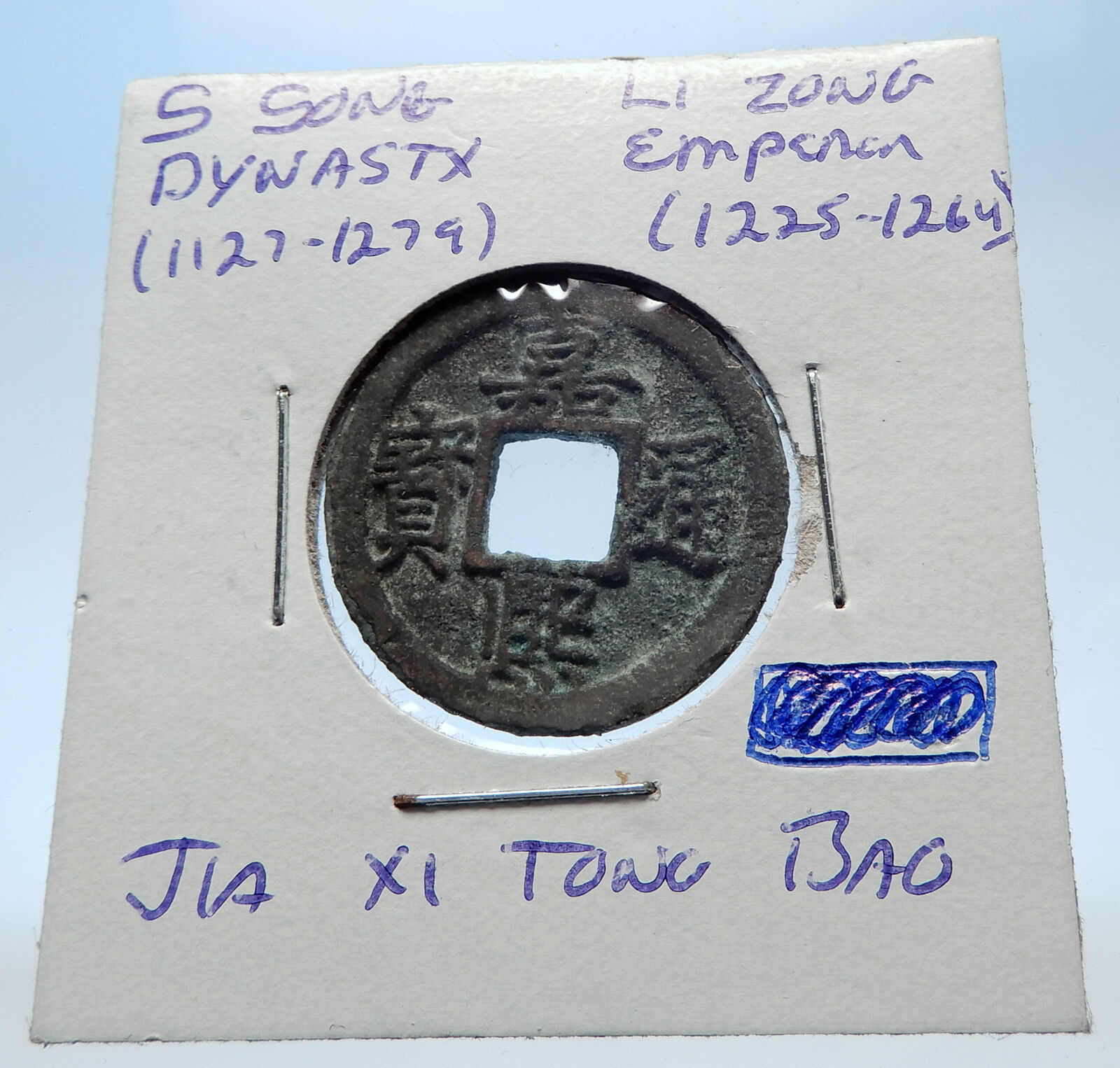|
China – Yuan Dynasty (1280-1368 A.D.)
Chen Youlian – Yuan Rebel Emperor: 1360-1363 A.D.
Bronze Tian Da Yi Tong Bao 2 Cash 30mm (7.81 grams), Struck 1360-61 AD
Reference: H# 19.146
Chinese characters, square hole within.
You are bidding on the exact item pictured, provided with a Certificate of Authenticity and Lifetime Guarantee of Authenticity.
Chen Youliang (陳友諒; 1320 – October 3, 1363 was the founder and first emperor of the dynastic state of Chen Han in Chinese history.
Chen was born to a fishing family in Mianyang (沔陽) in present-day Hubei. Some say he was born with surname Chen, others say he was born with surname Xie (謝).
Vietnamese records say that Chen Youliang was the son of Chen Yiji (陳益稷 or Trần Ích Tắc), a Trần dynasty leader who settled in the Yuan dynasty. 4]
In his childhood, he grew up poor, him and his family were relatively unsuccessful fishermen. Chen once served as a district official before becoming a general under Ni Wenjun during the Red Turban Rebellion. Chen later killed Ni Wenjun on the excuse that Ni planned to assassinate Xu Shouhui, the Red Turban rebels’ leader. Chen later turned on Xu Shouhui and killed him.
In 1357, Chen proclaimed himself “King of Han” in Jiangzhou (江州; present-day Jiujiang, Jiangxi), and emperor the next year after Xu Shouhui died. His era name, as well as his empire’s name, was “Dahan” (大漢; literally “Great Han”). For 1359 to 1363 Chen’s fleet was the strongest on the upper Yangtze River. His power was at least as great as that of another rebel state, Wu, led by Zhu Yuanzhang, founder of the Ming dynasty. Rebels and warlords at the end of Yuan dynasty, including the territory controlled by Chen Youliang in early 1363
In 1360 the Dahan fleet and army began a long war against Wu forces – based at that time in Jiqing (present-day Nanjing) and was later renamed “Ming” in 1368. An attack on the Wu capital was defeated thanks to excellent Wu intelligence (likely due to the defection of part of the Dahan fleet earlier in the year). The war continued till the climactic Battle of Lake Poyang where the Wu fleet narrowly defeated the larger fleet of Dahan after three days of fighting.
A month after the battle at Lake Poyang, the Dahan fleet tried to break out from Lake Poyang, during the resulting ship battles Chen was killed (he was alleged to have died from an arrow wound in the head). He was 43 years old at the time of his death in October 3, 1363.
As his crown prince Chen Shan (陳善) had been captured, Chen Youliang was succeeded by his second son, Chen Li, who was soon attacked by the fleet and army of Wu. The conquest of Dahan took an additional two years but by April 1365 the Dahan empire was gone and all its lands were now part of the Wu power base.
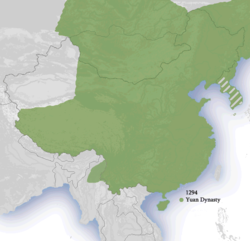 The Yuan dynasty, officially the Great Yuan, was the empire or ruling dynasty of China established by Kublai Khan, leader of the Mongolian Borjigin clan. It followed the Song dynasty and preceded the Ming dynasty. Although the Mongols had ruled territories including modern-day North China for decades, it was not until 1271 that Kublai Khan officially proclaimed the dynasty in the traditional Chinese style, and the conquest was not complete until 1279. His realm was, by this point, isolated from the other khanates and controlled most of modern-day China and its surrounding areas, including modern Mongolia. It was the first foreign dynasty to rule all of China and lasted until 1368, after which the rebuked Genghisid rulers retreated to their Mongolian homeland and continued to rule the Northern Yuan dynasty. Some of the Mongolian Emperors of the Yuan mastered the Chinese language, while others only used their native language (i.e. Mongolian) and the ‘Phags-pa script. The Yuan dynasty, officially the Great Yuan, was the empire or ruling dynasty of China established by Kublai Khan, leader of the Mongolian Borjigin clan. It followed the Song dynasty and preceded the Ming dynasty. Although the Mongols had ruled territories including modern-day North China for decades, it was not until 1271 that Kublai Khan officially proclaimed the dynasty in the traditional Chinese style, and the conquest was not complete until 1279. His realm was, by this point, isolated from the other khanates and controlled most of modern-day China and its surrounding areas, including modern Mongolia. It was the first foreign dynasty to rule all of China and lasted until 1368, after which the rebuked Genghisid rulers retreated to their Mongolian homeland and continued to rule the Northern Yuan dynasty. Some of the Mongolian Emperors of the Yuan mastered the Chinese language, while others only used their native language (i.e. Mongolian) and the ‘Phags-pa script.
The Yuan dynasty was the khanate ruled by the successors of Möngke Khan after the division of the Mongol Empire. In official Chinese histories, the Yuan dynasty bore the Mandate of Heaven. The dynasty was established by Kublai Khan, yet he placed his grandfather Genghis Khan on the imperial records as the official founder of the dynasty as Taizu. In the Proclamation of the Dynastic Name, Kublai announced the name of the new dynasty as Great Yuan and claimed the succession of former Chinese dynasties from the Three Sovereigns and Five Emperors to the Tang dynasty.
In addition to Emperor of China, Kublai Khan also claimed the title of Great Khan, supreme over the other successor khanates: the Chagatai, the Golden Horde, and the Ilkhanate. As such, the Yuan was also sometimes referred to as the Empire of the Great Khan. However, while the claim of supremacy by the Yuan emperors was at times recognized by the western khans, their subservience was nominal and each continued its own separate development.
|




 The Yuan dynasty, officially the Great Yuan, was the empire or ruling dynasty of China established by Kublai Khan, leader of the Mongolian Borjigin clan. It followed the Song dynasty and preceded the Ming dynasty. Although the Mongols had ruled territories including modern-day North China for decades, it was not until 1271 that Kublai Khan officially proclaimed the dynasty in the traditional Chinese style, and the conquest was not complete until 1279. His realm was, by this point, isolated from the other khanates and controlled most of modern-day China and its surrounding areas, including modern Mongolia. It was the first foreign dynasty to rule all of China and lasted until 1368, after which the rebuked Genghisid rulers retreated to their Mongolian homeland and continued to rule the Northern Yuan dynasty. Some of the Mongolian Emperors of the Yuan mastered the Chinese language, while others only used their native language (i.e. Mongolian) and the ‘Phags-pa script.
The Yuan dynasty, officially the Great Yuan, was the empire or ruling dynasty of China established by Kublai Khan, leader of the Mongolian Borjigin clan. It followed the Song dynasty and preceded the Ming dynasty. Although the Mongols had ruled territories including modern-day North China for decades, it was not until 1271 that Kublai Khan officially proclaimed the dynasty in the traditional Chinese style, and the conquest was not complete until 1279. His realm was, by this point, isolated from the other khanates and controlled most of modern-day China and its surrounding areas, including modern Mongolia. It was the first foreign dynasty to rule all of China and lasted until 1368, after which the rebuked Genghisid rulers retreated to their Mongolian homeland and continued to rule the Northern Yuan dynasty. Some of the Mongolian Emperors of the Yuan mastered the Chinese language, while others only used their native language (i.e. Mongolian) and the ‘Phags-pa script. 

